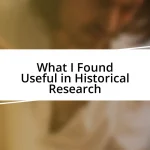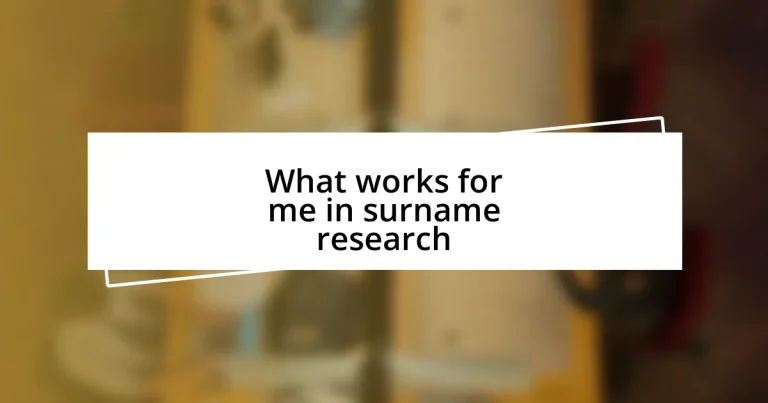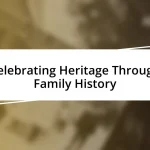Key takeaways:
- Surname research offers a profound connection to one’s identity and the experiences of ancestors.
- Identifying family origins through historical records and local folklore enhances understanding of personal heritage.
- Utilizing genealogical records reveals not just factual information but also the emotional experiences of ancestors.
- Collaboration in surname groups fosters community, encourages shared stories, and can lead to unexpected familial connections.
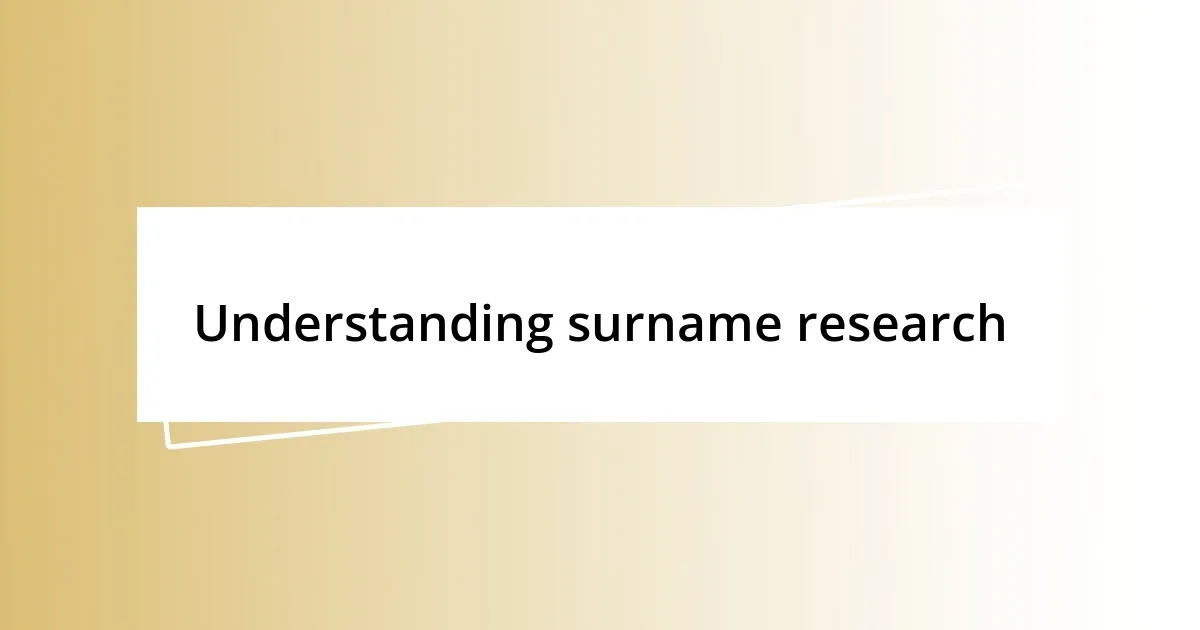
Understanding surname research
Surname research is an intriguing journey into our past. I remember the moment I discovered that my last name had origins tracing back to a small village in England. It’s like uncovering a piece of your identity; you start to wonder who those ancestors were and how their lives shaped the world today.
As you dive deeper into surname research, it’s essential to consider the cultural, linguistic, and historical contexts that influenced name formations. For instance, did you know that names can often reveal occupations or geographical roots? This exploration can evoke a real sense of connection, prompting questions like, “What kind of life did my great-great-grandfather lead?” Each name carries stories that can resonate with our own experiences.
The emotional weight of this research cannot be overstated. When I saw an old family tree for the first time, I felt an overwhelming sense of belonging. There’s a unique thrill in piecing together family histories, as though we are part of a much larger narrative. How has your surname shaped your sense of self? In this journey, every discovery adds a new thread to the fabric of our identity.
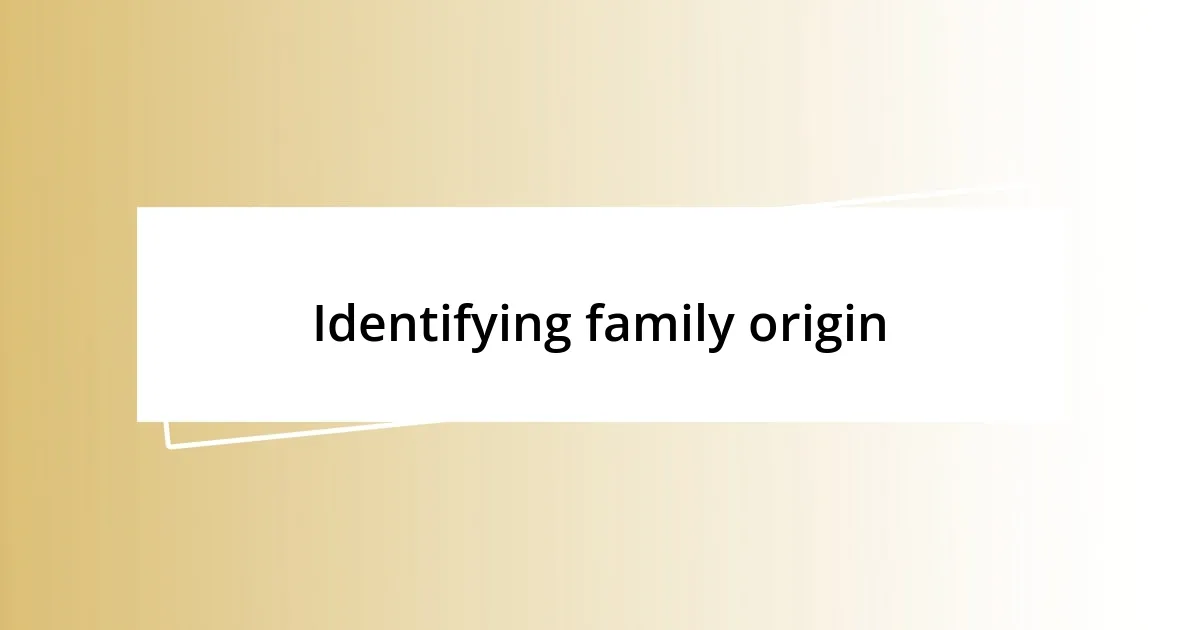
Identifying family origin
When I set out to discover my family’s origin, I realized that these names are often more than just labels; they carry a profound history behind them. I remember being particularly struck by the meaning of my own surname, which originally indicated a specific location. At that moment, it felt like I was tracing not just geographical lines, but also the emotional footprints left by my ancestors.
To effectively identify family origins, consider these approaches:
– Research historical records: Look at census data, birth and marriage certificates, which can provide clues about geographical roots.
– Explore name etymology: Delve into the meaning and derivation of your surname; this might reveal details about social status or occupation.
– Connect with cultural history: Understand the cultural setting your ancestors came from, as names are often influenced by language and traditions.
– Utilize online family trees: Platforms like Ancestry and MyHeritage can show how your name fits into larger family contexts.
– Tap into local folklore: Sometimes, stories passed through generations can hold keys to your family’s origin.
Each of these steps has the potential to unlock new facets of your heritage, filling in the gaps of your personal story. Just as I did, you may find yourself experiencing a mix of nostalgia and excitement as you piece together the lives of those who came before you.
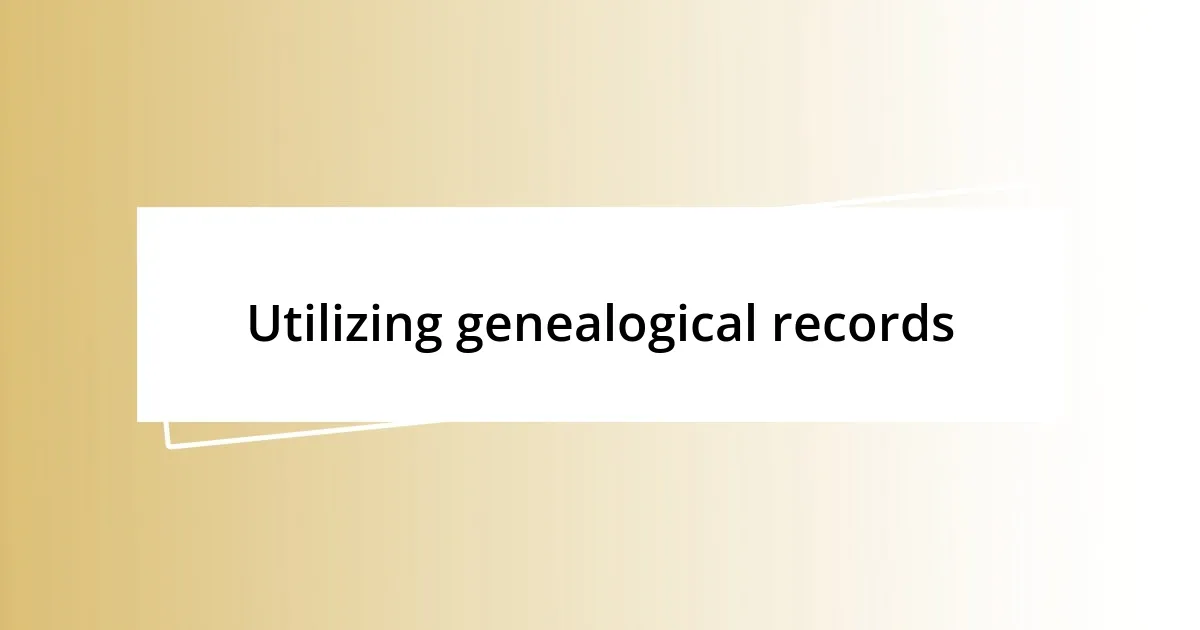
Utilizing genealogical records
Utilizing genealogical records has been a transformative aspect of my surname research journey. I recall sifting through old census records and feeling a rush of excitement with each name I encountered. The discovery of my ancestors’ recorded lives opened a window to their daily struggles and achievements. Every detail, like their age or occupation, felt like a tiny puzzle piece fitting into the broader narrative of my identity.
Different records serve unique purposes in genealogy. Birth and marriage certificates provide essential ties between generations, while immigration documents can tell the story of how families crossed borders seeking new opportunities. I’ll never forget the day I unearthed a ship manifest listing my great-grandparents’ arrival in America. That moment connected me to a time of hope and determination, shaping my understanding of their sacrifices and dreams for our family.
It’s fascinating to see how genealogical records can reveal not just facts, but also the emotional tapestry of our ancestors’ lives. Each record I’ve explored has brought me closer to their experiences, igniting a sense of empathy as I visualize their struggles and triumphs. I invite you to ask yourself: how will the stories you uncover change the way you view your own life and history?
| Type of Record | Insights Gained |
|---|---|
| Census Records | Population demographics and family structure |
| Birth/Marriage Certificates | Direct ties between family members, life events |
| Immigration Documents | Journey of ancestors, motivations for relocation |
| Military Records | Service history, sacrifices of ancestors |
| Land Deeds | Ownership and settlement patterns |
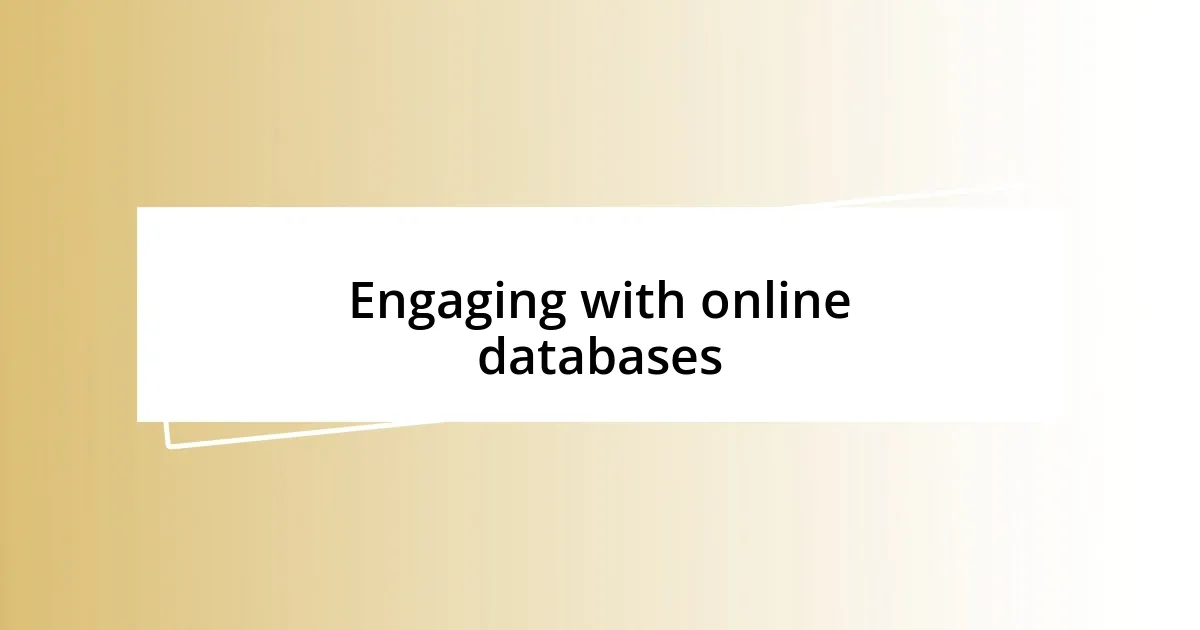
Engaging with online databases
Engaging with online databases has been a game-changer for my surname research journey. I vividly remember the excitement of logging into a genealogy platform for the first time and finding a treasure trove of information. It was like opening a digital door to my family’s past, allowing me to explore records that linked me to distant relatives I never knew existed.
One of the most profound experiences I had was discovering an online database filled with newspaper articles documenting my ancestors’ lives. I stumbled upon a piece that reported my great-great-grandfather’s heroic efforts during a local flood. As I read through the article, I felt a surge of pride and a deeper connection to my roots. It made me ponder: how many untold stories lie hidden within the databases waiting for someone to uncover them?
What I love about these databases is their ability to connect different pieces of history. I found that cross-referencing family names across several platforms not only helped me confirm dates but also enriched my understanding of my lineage. By collaborating with other researchers online, I encountered families that intertwined with mine, sparking friendships over shared histories. Engaging with these digital resources has been both a practical tool and a source of emotional connection that reveals the layers of who I am today.
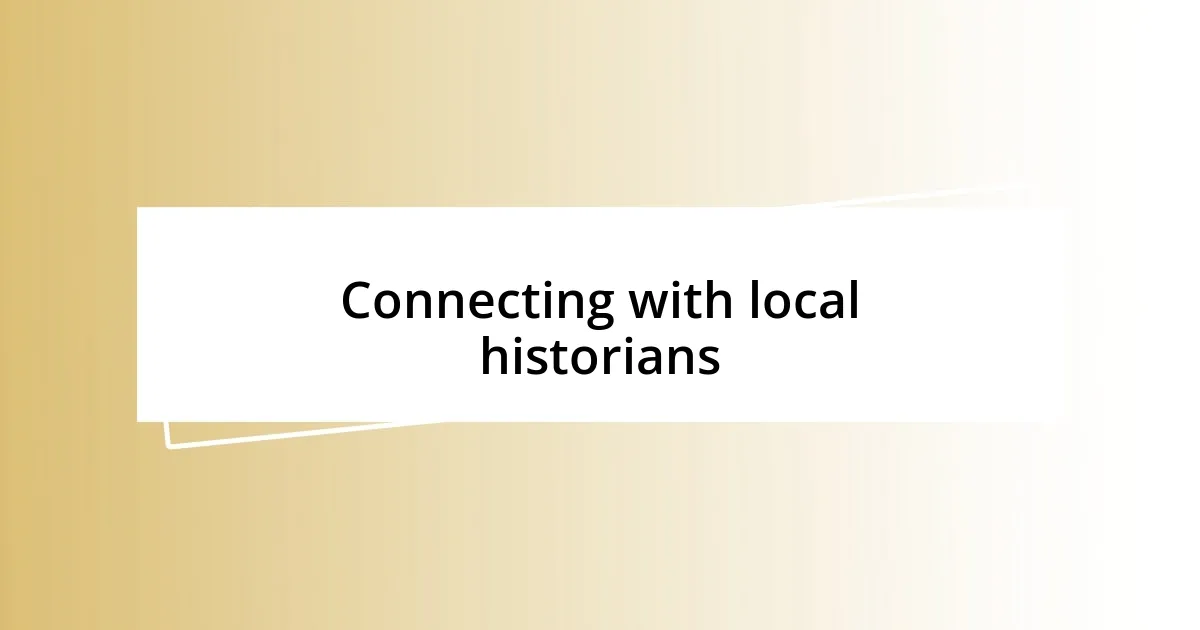
Connecting with local historians
Connecting with local historians has been an invaluable part of my surname research journey. I still remember attending a local history meeting and feeling a wave of excitement as I met people passionate about our shared heritage. Their stories, detailing events that shaped our community, provided a context that mere records couldn’t offer. Isn’t it fascinating how local histories can breathe life into dusty archives?
During one memorable encounter, a local historian shared a scrapbook filled with newspaper clippings about my great-uncle’s contributions to the town during the war. As I flipped through the pages, my heart swelled with pride. These snippets of the past connected me emotionally to a family member I had only heard about in passing. Hasn’t everyone felt that thrill when an unexpected connection appears at a pivotal moment?
I’ve also discovered that engaging with local historians can open doors to resources I previously overlooked. They often hold unique insights and documents that might not be available online or in libraries. When I sought out one historian for help, they directed me to an archival collection filled with oral histories from residents. The firsthand accounts I encountered there enriched my understanding of my ancestors’ struggles and triumphs. What treasures might you uncover by reaching out to your local experts?
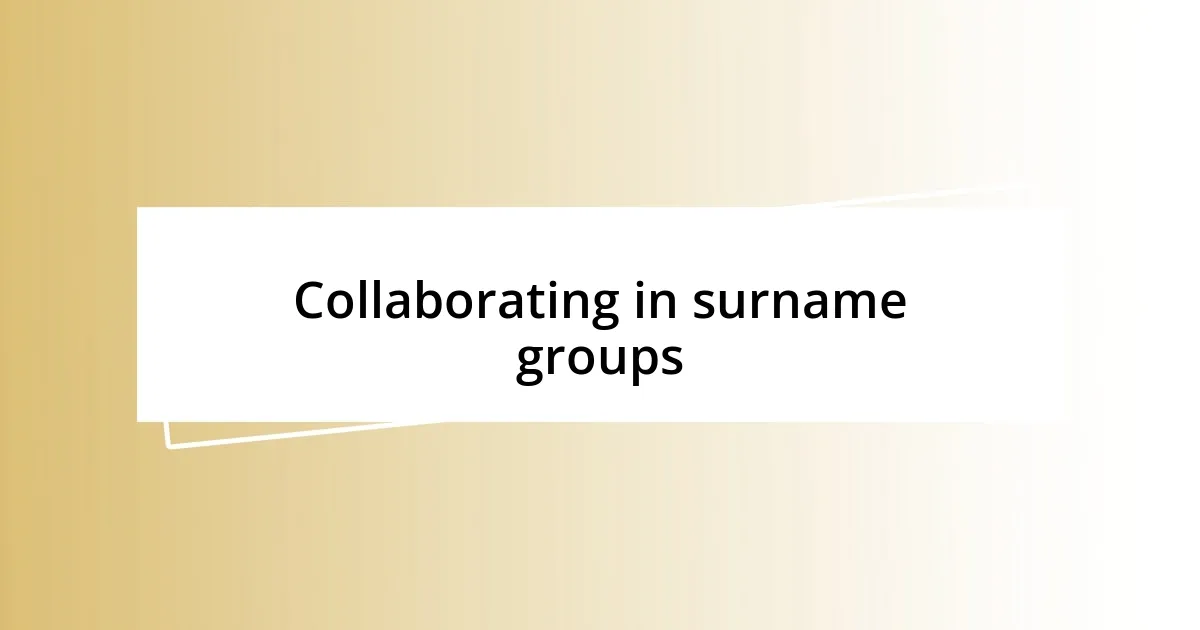
Collaborating in surname groups
I find that collaborating in surname groups can really elevate the search for family history. I remember joining a Facebook group dedicated to my surname, and it was enlightening! I posted a query about a brick wall I’d hit—my great-grandfather’s origins—and within hours, responses flooded in. People shared similar stories, offered insights, and even provided contact information for distant cousins who had pieces of the puzzle. Isn’t it amazing how a simple post can create connections?
One experience stands out: a fellow group member shared a photo of a family reunion from decades ago. To my surprise, I spotted my grandma in the background! I reached out to her, and it turned into a beautiful moment where I learned family stories I had never heard before. I often wonder how many of us have faces and stories waiting to be discovered through these collaborative platforms.
Engaging with these groups can also lead to collaborative projects. In one group, members decided to compile a family history book, pooling together our individual findings. Working alongside others ignited a sense of camaraderie that was both fulfilling and enriching. I’ve realized that researching is not just a solitary pursuit; it’s about tapping into a collective wisdom that can reveal our shared lineage in ways we might never have anticipated. How often do we overlook the power of community in our individual quests for knowledge?
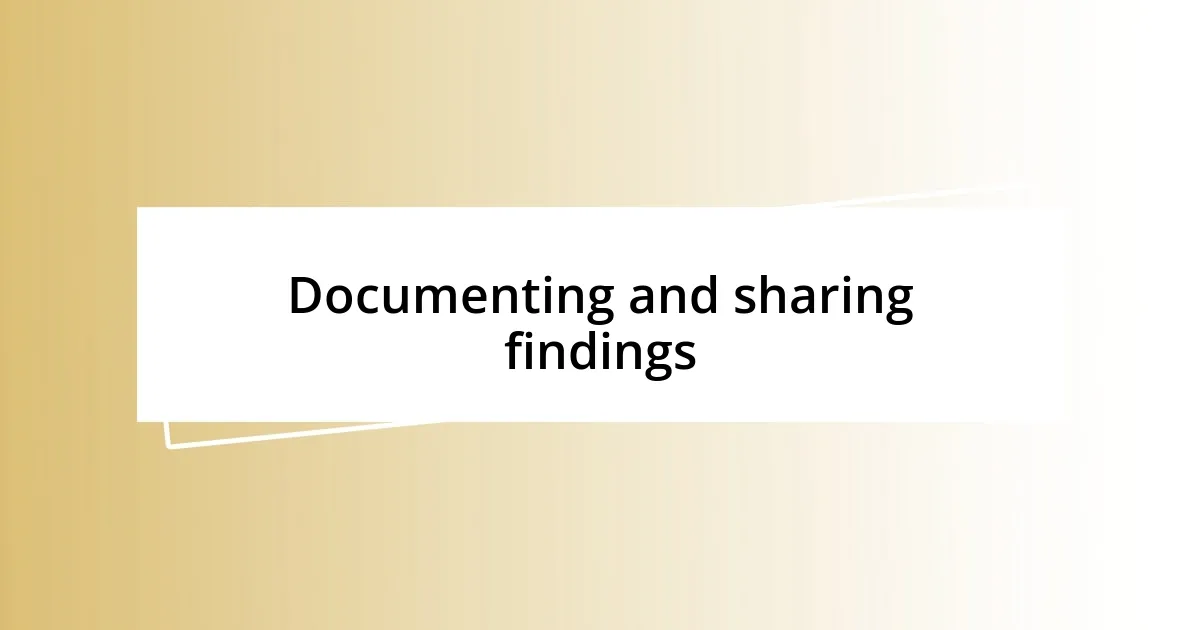
Documenting and sharing findings
Documenting my findings has always felt like crafting a personal narrative, a way to weave together the threads of my family’s history. Whenever I uncover new information—whether it’s a census record or an old letter—I jot down my thoughts and feelings in a dedicated journal. This practice not only helps me remember key details but also captures the emotions attached to each discovery. Have you ever reflected on how much richer your research feels when you document not just the facts but the stories behind them?
Sharing these findings with fellow enthusiasts adds another layer of meaning to my research. I vividly remember hosting a small gathering of friends who are also into genealogy. Excitedly, I presented my discoveries, showcasing documents and photos, and to my delight, they reciprocated by sharing their own family stories. This exchange was exhilarating! It reinforced my belief that sharing findings doesn’t just educate others; it ignites conversations that can lead to unexpected connections. Have you ever experienced that spark of creativity when someone else’s story resonates with your own?
Through platforms like blogs and social media, I’ve found community and support in sharing my insights. For instance, I once wrote a detailed post about my ancestor’s immigration journey, and the responses were both heartwarming and eye-opening. One reader reached out, revealing they were a distant relative with even more information to add. Moments like these highlight the importance of sharing; they remind me that our stories are part of a larger tapestry. Isn’t it incredible how a single post can bridge years of separation and bring families together?





